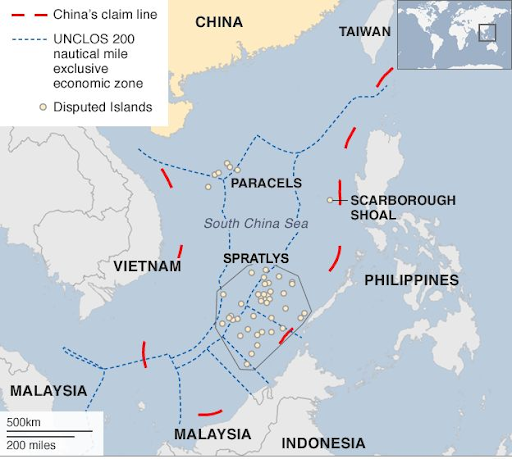China announced a new set of maritime regulations last week that require ships carrying certain types of cargo to provide detailed information to the Chinese authorities when transiting through Chinese “territorial waters”. The move has been expected to have far-reaching consequences for the passage of vessels, both commercial and military, in the disputed South China Sea, East China Sea, and Taiwan Strait, and is to escalate the existing tension with the US and its neighbours in the region.
The South China Sea is at the arm of the Western Pacific Ocean in South East Asia. China, Taiwan, the Philippines, Malaysia, Brunei, Indonesia, Singapore, and Vietnam are the bordering territories. It connects Taiwan Strait with the China Sea whereas Luzon Strait with the Philippine Sea. South China has numerous shoals and islands including Parcel Island, the Spratly Sea, and Scarborough Shoal which are also considered to be extremely important. One-third of the world’s shipping passes through these lanes, and the waters house numerous important fisheries.
According to the new maritime rules which will take effect from 1st September 2021, vessels will have to report their information when passing through what China claims as to their territorial water. China claims most of the South China Sea water as them under the “Nine Dash Line”. This is also the major disputed area with several other countries including the Philippines, Vietnam, Malaysia, and Indonesia. China over the period has claimed over 1.3 million square miles of the Sea and regards it as their sovereign territory. On top of it, it has been building up a military base on the artificial island in the region.
The South China Sea plays an important role in India’s trading partnership with countries like Japan, South Korea, and the ASEAN countries as well. As per the reports by the Ministry of External Affairs (MEA), more than 55% of India’s trade passes through these lanes as well. India is also involved in oil and gas exploration in offshore blocks in the margins of the Sea, which has led to standoffs with Chinese authorities.
According to the International agreement called the United Nations Convention on the Law of the Sea (UNCLOS), states have the right to implement territorial rights up to 12 nautical miles into the sea. It is under the same agreement that international maritime activities are governed. The UNCLOS has also stated that all vessels have the right of “innocent passage” through this region and China’s new law violates this.
India has always worked towards stability and peace in the region and these activities have threatened the same. Many experts are claiming that these laws are in reaction to the second Malabar exercise that happened in August this year. China not only sees this exercise as a threat but also the growing cooperation and coordination between the QUAD countries as well. The regional, as well as global tension, will increase if China continues to assert these claims and does not follow the rules and regulations under the UNCLOS.









